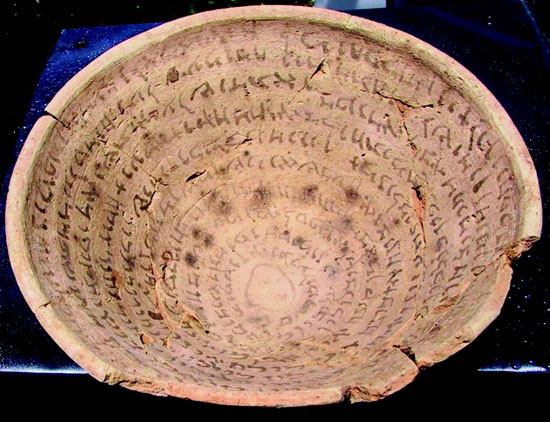 | | | This Babylonian incantation bowl dates from the 4th-6th century (approximate) CE. It was buried underneath a house in order to protect its inhabitants from demons. Photo courtesy Maggie Anton | | | | | | "Magical thinking has been with us since the beginning," said author Maggie Anton, despite the fact that "not a whole lot" has been written about women who practiced magic, especially in 3rd or 4th century Babylonia (now Iraq). Just don't equate those practitioners with ugly, evil hags in black clothes. Those female practitioners of magic are better called a sorceress, or enchantress. Indeed, "Enchantress" is the title of Anton's latest work, new this year from Penguin Books.
 Anton will speak about the research behind her book and the existence and acceptance of magic in that ancient world Dec. 10 at Lafayette's Temple Isaiah.
Anton will speak about the research behind her book and the existence and acceptance of magic in that ancient world Dec. 10 at Lafayette's Temple Isaiah.
 Anton's historical fantasies are based on Jewish history and her own Talmudic studies. The author, who "didn't intend to be an author" (her first career was in clinical chemistry) has published six books - five stories and one young adult adaptation since 2007 and won a 2012 National Jewish Book Award for "Rav Hisda's Daughter." But Anton says the reader needn't be Jewish or even religious to enjoy her books. Eighty percent of Americans already believe in angels, she said, and only a "fuzzy border" separates the word incantation from spell, blessing and prayer.
Anton's historical fantasies are based on Jewish history and her own Talmudic studies. The author, who "didn't intend to be an author" (her first career was in clinical chemistry) has published six books - five stories and one young adult adaptation since 2007 and won a 2012 National Jewish Book Award for "Rav Hisda's Daughter." But Anton says the reader needn't be Jewish or even religious to enjoy her books. Eighty percent of Americans already believe in angels, she said, and only a "fuzzy border" separates the word incantation from spell, blessing and prayer.
 Magic is a "hot topic" in scholarship circles, Anton said, and one she really enjoyed researching. While searching for historically accurate female names, Anton discovered Babylonian incantation bowls. She now owns two. "These were ordinary pottery with inscriptions inside whose purpose was to protect the people under whose home the vessels were buried. Thousands of these bowls had been unearthed in what is now Iraq and dated to the 4th, 5th and 6th century," she said. "Archeologists ... discovered Hebrew magic instruction manuals that list an astonishing variety of spells, some benevolent and some not. Magic was clearly an integral part of life in this world," Anton said, and through magic women gained power and autonomy. "My literary task was to show the heroine becoming an enchantress in a society where, unlike today, highly educated people accepted magic as real and effective." A subject like that will undoubtedly leave her audience spellbound.
Magic is a "hot topic" in scholarship circles, Anton said, and one she really enjoyed researching. While searching for historically accurate female names, Anton discovered Babylonian incantation bowls. She now owns two. "These were ordinary pottery with inscriptions inside whose purpose was to protect the people under whose home the vessels were buried. Thousands of these bowls had been unearthed in what is now Iraq and dated to the 4th, 5th and 6th century," she said. "Archeologists ... discovered Hebrew magic instruction manuals that list an astonishing variety of spells, some benevolent and some not. Magic was clearly an integral part of life in this world," Anton said, and through magic women gained power and autonomy. "My literary task was to show the heroine becoming an enchantress in a society where, unlike today, highly educated people accepted magic as real and effective." A subject like that will undoubtedly leave her audience spellbound.
 Anton's presentation will be at 7 p.m. Wednesday, Dec. 10 at Temple Isaiah, 945 Risa Road, Lafayette.
Anton's presentation will be at 7 p.m. Wednesday, Dec. 10 at Temple Isaiah, 945 Risa Road, Lafayette.

|
